Week ahead in Parliament
- Published
- comments
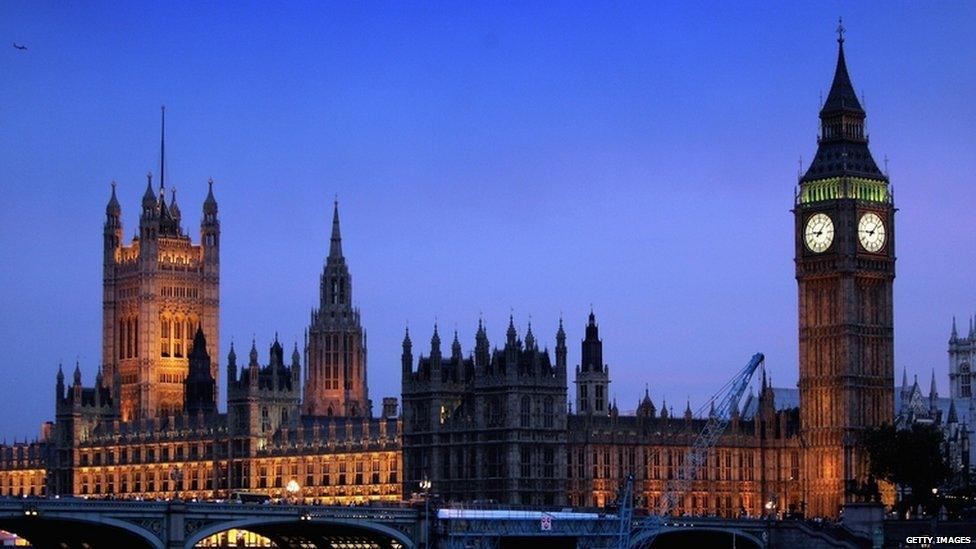
After its defeat on the EU (Withdrawal) Bill, on Wednesday, the government now faces a dilemma.
How to deal with its rebel MPs? Mailed fist or Love Bomb? Reconciliation or Revenge? Can the core group of Conservatives who defied their whip, and the equally important group of abstainers, best be brought back into line by threats or inducements, or (and for some ministers this may be the worst-case scenario) by accommodating their views?
The government has one more day of committee stage consideration on the EU (Withdrawal) Bill , externalnext Wednesday, complete with another issue, the formalisation of the Brexit date and time, on which it might face defeat, followed by two more days of report stage, in the New Year.
So the rebels have the potential to inflict further defeats - and they could make life very difficult now that the government is boxed into putting the final Brexit deal into a bill which then has to run the parliamentary gauntlet.
And while all the focus is on the Europhile Tory rebels, that final bill on the final deal could embody a Brexit so soft that it is the hard Brexiteers who rebel.
Elsewhere the prime minister makes her first appearance of this Parliament before the Common Liaison Committee, the super-committee of select committee chairs.
In the 2015-17 Parliament, with Andrew Tyrie in the chair, the questioning sharpened up noticeably. And with Sarah Wollaston, one of last Wednesday's Brexit rebels now in the chair, and pledging no return to the deferential soft questioning of yesteryear, the atmosphere may be rather interesting.
In the Lords, meanwhile, peers will be debating Lord Burns' scheme to reduce the size of the Upper House, external, by persuading the party groups and crossbenchers to encourage some of their membership to leave; the plan is that a "two-out, one in" policy would continue infusions of new blood, while ultimately slimming down the House to 600 members, over 10 years.
But this requires everyone to sign up, so the "taking of the voices" scheduled for Tuesday will reveal whether the Burns proposals will fly.
Here's my rundown of the week ahead:
Monday
The Commons meets (2.30pm) for Work and Pensions questions. Expect the usual battery of urgent questions and statements at 3.30pm, and in particular one from the prime minister on the latest EU summit.
After that MPs will move on to the first day of detailed committee stage consideration of the Finance Bill., external
The Labour frontbench has a series of amendments down to require a report on the effectiveness of the bank levy, including the extent to which it is delivering on its stated aims, like moving banks away from riskier funding models and requiring HMRC to prepare a public register of banks paying the levy and the amount they have paid.
As at second reading, there's a backbench amendment from Labour's Stella Creasy - who wants the bank levy to target Private Finance Initiative (PFI) companies which she accuses of "acting like legal loan sharks to the public sector".
She says PFI interest rates are causing severe strain on the budgets of their local schools and hospitals and fears that the next wave of contracts will prove even more expensive. "If the companies themselves overcharging the public sector for credit won't propose how to renegotiate these costs to a more reasonable rate then parliament could send a strong message that it is prepared to use a windfall tax to get a better deal for the British public and reclaim some much needed funds for our public services," she says.
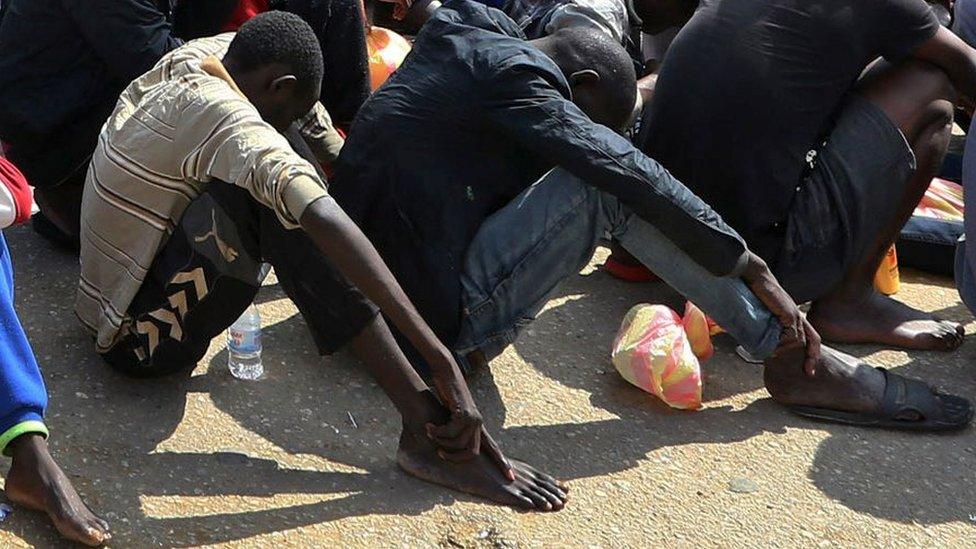
The International Migration Organization says it has gathered evidence of slavery in Libya
The adjournment debate, led by the SNP's Westminster Leader, Ian Blackford, is on RBS branch closures in rural areas - a subject he raised in PMQs.
In Westminster Hall (4.30pm), MPs will debate e-petition 205476, external: "CNN has released video footage of a black Africans being sold into slavery in Libya. I am asking the UK government to put pressure on the Libyan government to take immediate action to stop these criminals from selling more people, to set current prisoners free, arrest the criminals and end this."
So far this has attracted 264,334 signatures - and the government has said that it shares the public's outrage and welcomes the Libyan government's commitment to investigate these reports and to ensure that those involved are brought to justice.
In the Lords (2.30pm) questions to ministers cover enforcing minimum wage legislation to end unpaid internships , the Disaster and Emergencies Preparedness Programme, new approaches to mental health assessments for looked-after children and better surveillance of the UK's borders.
Peers will then debate the two select committee reports - first, one on Financial Exclusion, external, which recommends that the government should appoint a clearly designated minister for financial inclusion, add financial education to the primary school curriculum, and, above all that it should abolish the seven-day waiting period at the start of a Universal Credit claim.
Second there is the report on Brexit trade in non-financial services, external - which highlights that Existing EU Free Trade Agreements with third countries do not provide a like-for-like replacement for existing trade terms, so "in respect of services, the UK's future FTA with the EU would need to be the most comprehensive in history."
The report warns that losing access to the single market, or failure to secure a FTA at all (a 'no deal' scenario), could risk significant damage to the UK's services sectors. For instance, WTO rules do not provide for trade with the EU in aviation or broadcasting services at all.
Tuesday
The Commons opens (11.30am) with Health questions, followed by the presentation of a bill from the Labour MP John Mann to require pension providers to make lump sum payments and other pension benefits available to people with ill health, including people with a terminal diagnosis, prior to such people reaching minimum pension age. All that happens here is that the title of the bill is read out; there is no debate or discussion.
Then comes a Ten Minute Rule Bill on Emergency Response Drivers (Protections) Bill. It's from the Conservative, Sir Henry Bellingham. He wants to reform the law so that police and security services involved in vehicle pursuits of criminals are given further protection - and in particular that the disciplinary authorities, the Crown Prosecution Service and the courts can take into account an officer's specialist training and expert driving.
Then MPs return to the detail of the Finance Bill, with their second day of committee of the whole House consideration.
In Westminster Hall (9.30am-11am) the big morning debate, led by Labour's Stephen Kinnock is on the Steel Sector Deal, external - he says the government's industrial strategy was announced to great fanfare, but offered absolutely nothing to British steel.
Other Westminster Hall subjects include: environmental and food system education in schools (11am-11.30am); social mobility in Wales (2.30pm -4pm); the Blue Belt programme of marine protected areas (4pm-4.30pm) and childcare for fostered children (4.30pm-5.30pm).
My committee pick is the Business, Energy and Industrial Strategy hearing on the draft Domestic Gas and Electricity (Tariff Cap) Bill (10.15am) which they are scrutinising before it is fed into the parliamentary machine, proper.
They will be quizzing witnesses from E.ON UK, Centrica, First Utility, Co-op Energy and Ecotricity, amongst others. The session will examine suppliers' views on the impact price controls will have on their capacity to operate efficiently and innovate.
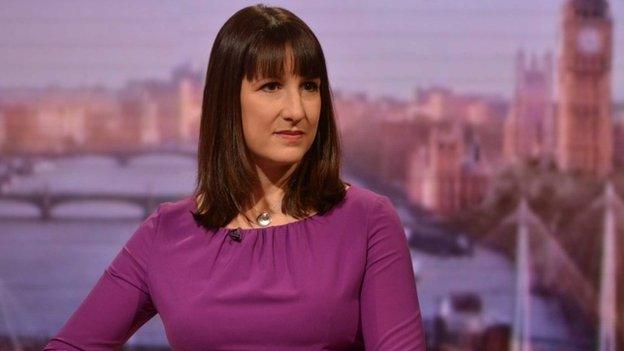
Rachel Reeves, the committee chair, says the energy market is failing: "Millions of customers are paying too much for their energy, with 12 million customers stuck on Standard Variable Tariffs and being hit in the pocket for their loyalty. It's increasingly clear from our evidence that there is a lack of progress in tackling the issue of SVTs and that more needs to be done to reduce consumer bills."
In the Lords (11am) peers have an early start in order to debate themselves, or at any rate the Burns Committee Report on the size of the House, which recommends a phased slimming programme to reduce the size of the Upper House to 600 peers, in just over 10 years.
House of Lords 'should lose 200 peers'
This is a consultative debate on a "take note" motion, but even so, at the time of writing, 97 peers have put in to speak. The debate will break for lunch and then the normal half hour question time will be held at 2.30pm, covering issues like government policy on capping energy prices, supporting women to use the legal system to challenge workplace sexual harassment, and reviewing vaping regulations, before they resume at about 3pm.
This debate is intended as the first step towards establishing a consensus around the Burns proposals - which do not need legislation, but absolutely must have all-party buy-in, to make them work.
Wednesday
The Commons opens at 11.30am for Northern Ireland questions, followed at noon by the final Prime Minister's Questions of a turbulent 2017.
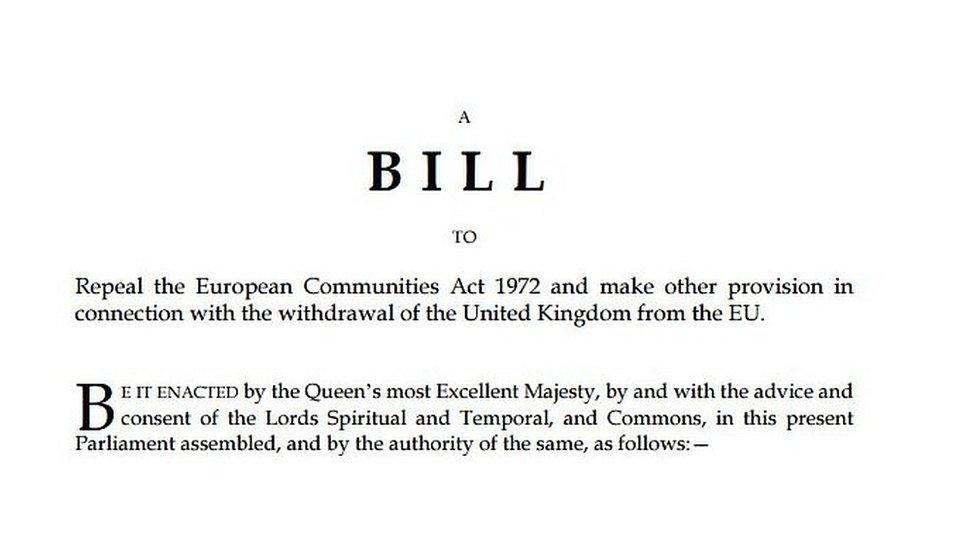
Joan Ryan, the Labour former Home Office minister for nationality and citizenship, then presents a Ten Minute Rule Bill calling for immigration detention safeguards for victims of torture and other vulnerable people, including those that have suffered from severe physical, psychological or sexual violence.
Then it's back to the committee stage of the European Union (Withdrawal) Bill, external - for the eighth and final day of committee of the whole House.
The debate comes in two bite-sized chunks, on the clause dealing with financial matters and then on the clause on interpretation of retained EU law. The big issue looks to be the government's amendment 381 to set the moment of Brexit at 11pm on March 29, 2019; while amendments 382 and 383 are preparatory for that amendment.
Slightly bizarrely, this issue was actually debated, but not voted on, during the first day of committee stage, back in mid-November. Labour have dismissed the government amendment as a gimmick and it has been targeted by "rebel commander" Dominic Grieve - so it may face defeat, and could even be dropped by the government.
Watch out, too for the Lib Dem amendment 120 calling for a "confirmatory" referendum on the Brexit terms. This is in no danger of being passed, but keep an eye on the level of support it attracts from the Labour benches.
The big morning Westminster Hall debate (9.30am-11am) is on the situation in Ukraine - led by the Chair of the All Party Parliamentary Group on Ukraine, John Whittingdale. He's just back from a visit to the front line in the civil war there (against Foreign Office advice) where he saw first-hand the continuing fighting.
He plans to criticise Russia's role and to call for encouragement for the process of internal reform in Ukraine. Foreign Office Minister Alan Duncan is expected to reply, and the Ukraine ambassador is expected to be in the public gallery.
Other subjects for debate in Westminster Hall include the government response to corrosive substance attacks (2.30pm-4pm); International Human Rights Day (4pm-4.30pm) and delivery charges in Scotland (4.30pm-5.30pm).
The big committee event is the long awaited, long delayed first appearance of this Parliament of the PM at the Commons Liaison Committee (3.15pm).
Topics likely to be covered include: Brexit negotiations and transition arrangements; sustainable long term funding for health and social care (a big issue for Health Committee Chair Dr Wollaston, and one where the PAC Chair Meg Hillier, the CLG Chair Clive Betts and others are also active); progress since the PM's pledge on the steps of Downing Street to fight "burning injustices"; and sexual harassment.
In the Lords (3pm), questions to ministers range across the government response to the Parliamentary Advisory Group report on carbon capture, the situation in Syria and the advice from the Attorney General on the revocability of Article 50(2) and the UK's intention to withdraw from the EU.
The day's debates are on a series of select committee reports, starting with the EU Committee report on Brexit: justice for families, individuals and businesses?, external which considers the ramifications of Brexit for justice cooperation on such issues as divorce, disputed custody of children, medical negligence, litigation arising out of a car accident abroad and employment disputes.
Then peers turn to the report from the select committee reviewing the operation of the Licensing Act 2003, external - which found that it provided "an inadequate statutory framework whose basic flaws have, if anything, been compounded by subsequent piecemeal amendments." It calls for a comprehensive overhaul of licensing law.
Finally they debate a report from the Science and Technology Committee Connected and Autonomous Vehicles: The future?, external which concluded that the government is too focussed on driverless cars when the early benefits from this technology are likely to be in the marine and agriculture sectors.
Thursday
It's the last day of term in the Commons, and by tradition MPs are allowed to bring in board games.
Alternatively they can attend Digital, Culture, Media and Sport questions (9.30am) followed by questions to the Attorney General (10am).
Then, assuming there are no last-day urgent questions or statements, the main debates are on subjects chosen by the Backbench Business Committee.
First, the Lib Dem Tom Brake will lead a debate on Russian interference in UK politics and society - he wants to probe ministers' understanding of what is going on, and will raise issues about anonymous social media accounts and whether political parties should be considered as critical national infrastructure.
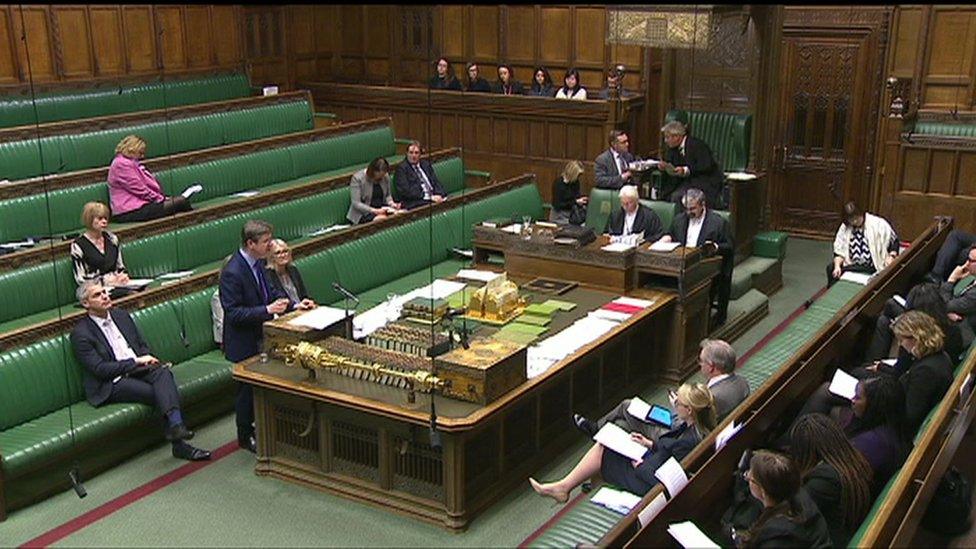
After that comes the traditional end of term debate on matters to be raised before the forthcoming adjournment - this allows any MP the chance to make a speech on any subject. Spare a thought for Deputy Leader of the Commons Michael Ellis, who has the unenviable task of responding to this completely amorphous debate - something he will be doing for the sixth time.
In the Lords (11am) peers question ministers on the impact of the UK leaving the EU on affordable housing, the number of social houses built as a consequence of the Budget and the equalities impact assessment the government have undertaken into the implications of Brexit.
Then they have two backbench-led debates, on the global effects of climate change on and on the impact of the ivory trade on endangered species.
After that Parliament departs until Monday 8 January.